News
Popular searches: Influenza, Childhood cancer, Endometriosis, Inflammation
-
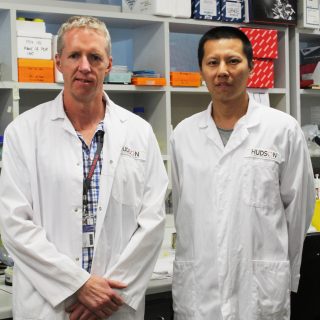
Biomarker offers hope for diagnosis of early stomach cancer
Scientists at Hudson Institute of Medical Research have identified a family of genes that could more accurately detect stomach cancer in its early stages to help improve survival rates. Stomach or gastric cancer is the third leading cause of cancer death worldwide. It is caused by the abnormal growth of cells in the lining, or… Read more
-
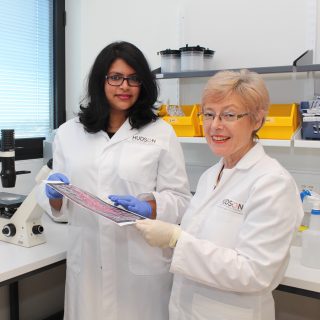
Bioengineering: the new approach for treating pelvic organ prolapse
Hudson Institute of Medical Research scientists are combining stem cells from the lining of a woman’s own uterus with nanobiomaterials (biodegradable materials engineered on the nanoscale) in a world-first approach to develop safer, more effective treatments for pelvic organ prolapse.… Read more
-

Newborn delayed cord clamping recommendations
Premature and full-term babies who do not require respiratory support may benefit from leaving their umbilical cord unclamped for at least 60 seconds after birth, according to the authors of a Perspective published by the Medical Journal of Australia.… Read more
-

Flicking the immune ‘switch’ to repair multiple sclerosis damage
Discovering new treatments to repair damage to nerve cells caused by Multiple Sclerosis (MS) will be the focus of research at Hudson Institute of Medical Research, thanks to funding from MS Research Australia. Dr Claire McCoy has been awarded a $25,000 MS Research Australia incubator grant to progress her research into the role of macrophages,… Read more
-
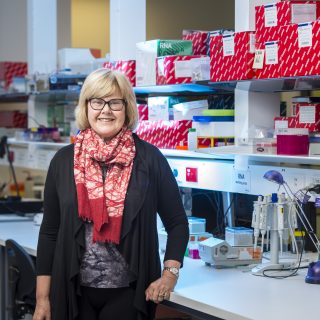
Leading next generation IVF
La Trobe University and Hudson Institute of Medical Research are leading pioneering research aimed at understanding infertility and improving the rate of assisted and natural pregnancies – an approach that may lead to ‘personalised IVF’. The team, led by Dr David Greening from La Trobe Institute for Molecular Science and Professor Lois Salamonsen from Hudson… Read more
-
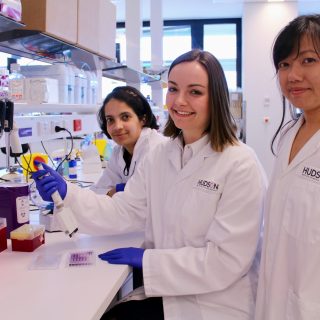
Childhood cancer ‘organoid’ program set to revolutionise treatment
The Hudson Monash Precision Medicine Program hopes to significantly improve treatment for childhood cancer patients with the greatest unmet clinical need – those diagnosed with brain cancers and solid tumours. Launched today (February 7) ahead of International Childhood Cancer Day on February 15, the two year program is being established with a $1.3 million investment… Read more
-

VCA Fellowship targets ‘rare and aggressive’ childhood cancer
Dr Jason Cain has been awarded a Victorian Cancer Agency (VCA) Mid-Career Fellowship for his research to help tackle a rare and aggressive form of childhood cancer. Dr Cain was one of 14 successful VCA funding recipients announced by Acting Minister for Health, Martin Foley as part of a $7 million investment by the Victorian… Read more
-
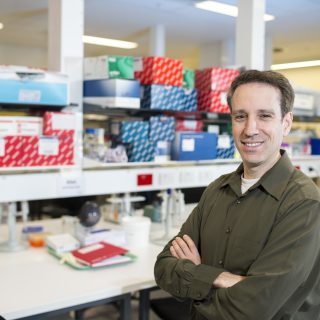
Cutting edge genome editing toolbox for precision medicine
A cutting-edge CRISPR library containing more than 36,000 molecular scissors targeting every known gene in the human genome is realising the clinical potential of precision medicine research at Hudson Institute. Hudson Institute scientists now have access to the award-winning Merck/Sanger Arrayed Whole Genome CRISPR Library on-site at the Monash Health Translation Precinct. Associate Professor Ron… Read more
-

Professor Rosemary Horne awarded Doctor of Science
Professor Rosemary Horne has been awarded a Doctor of Science from Monash University for more than three decades of research that has shaped the understanding of sleep in children and infants. The Doctor of Science (DSc) is of a higher standing than a PhD and is awarded for work that makes an original, substantial and… Read more
-

Therapy brings long-term hope for halting Parkinson’s Disease
How deep brain stimulation therapy could help to slow or halt the progression of Parkinson’s Disease is the focus of new research by Dr Joohyung Lee, thanks to a grant from the Bethlehem Griffiths Research Foundation. “Parkinson’s disease (PD) is primarily associated with the inability to initiate and control voluntary movement. These symptoms result from… Read more
